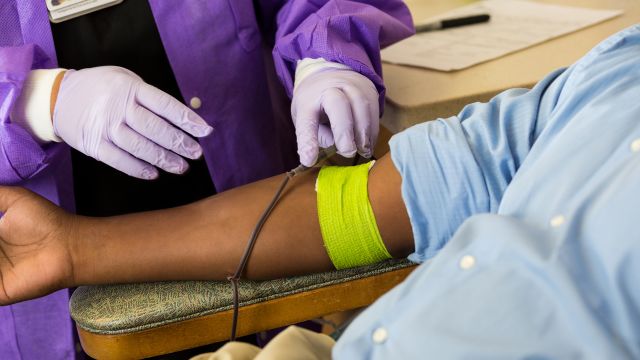Updated on March 18, 2025.
Hepatitis C is a dangerous virus that causes inflammation in the liver. It’s spread through blood from someone with the virus. Sometimes it causes an acute (short-term) infection. But for most people, it becomes chronic and remains for life—or until you receive treatment.
Treatment includes 8 to 12 weeks of an antiviral medication, which eliminates the infection in 95 percent of patients, according to the Centers for Disease Control and Prevention (CDC). If left untreated, hepatitis C can cause liver damage, scarring of the liver (cirrhosis), and potentially liver cancer.
Symptoms of hepatitis C may take decades to appear. As a result, many people are unaware they have the virus and don’t receive treatment. In the meantime, it can spread to others.
Since symptoms are often silent and there’s no vaccine for hepatitis C, screening for the disease is critical. Screening is recommended for people ages 18 years and older at least once during their lifetime and for all pregnant people each time they’re pregnant. Screening should occur more often if a person has a known risk factor for hepatitis C.
Here’s what to know about those risk factors, as well as the screening process and potential signs of hepatitis C.
Risk factors for hepatitis C
Certain people may be at higher risk for hepatitis C. These include:
- People who have ever injected drugs (even if only once or long ago)
- Those who received a blood or organ donation in the United States before July 1992 (after which better testing became available)
- Patients who have been on dialysis for kidney failure
- A person with HIV (human immunodeficiency virus)
- A child born to someone with hepatitis C. Pregnant people with hepatitis C have about a 6 percent chance of passing it to their babies, according to the CDC.
- People who received blood-clotting products in the United States before 1987
- Healthcare workers who have had needle sticks or other body fluid exposures
- Patients who may have been exposed to contaminated instruments or intravenous medications
It’s also possible, though not as common, to get the virus by:
- Sharing items that may have come into contact with blood, such as a toothbrush, nail clippers, straw, or a razor
- Having sex with an infected partner, particularly men who have sex with men
- Getting tattoos, body piercings, acupuncture, or electrolysis outside of a sterile, licensed setting
- Having a medical or dental procedure in a country that lacks strict infection control
People in these higher-risk groups should get tested, sometimes routinely, if they continue to be exposed to risk factors.
Hepatitis C symptoms
Most cases of acute hepatitis C happen in adults ages 20 to 39 years old. About 75 to 85 percent of those with an acute infection won’t show any symptoms, according to the CDC. For those who do develop symptoms, they typically present about 2 to 12 weeks after exposure, sometimes longer. Acute hepatitis C may symptoms include:
- Fever
- Loss of appetite
- Abdominal pain
- Joint pain
- Fatigue
- Nausea and/or vomiting
- Dark urine
- Bowel movements with a clay color
- Jaundice (yellowing of the skin and/or eyes)
Around 15 to 25 percent of people with an acute infection clear it on their own, meaning it goes away completely. For the other 75 to 85 percent, the virus still lingers in the body, developing into a chronic illness. Over time, a person may develop liver damage. This can bring on fatigue and jaundice, as well as serious symptoms like weight loss, bleeding or bruising easily, spider veins, swelling, and problems with thinking and speaking.
See your healthcare provider (HCP) if you notice any of these symptoms.
Getting tested
Most people with hepatitis C don’t look or feel sick, making screening a lifesaving tool. Your HCP can order a blood test that will look for signs your body was exposed to hepatitis C (antibody testing). If the test is positive, your HCP can test you further to see if hepatitis C is currently still active in your blood (RNA testing).
It usually takes about 8 to 11 weeks after infection before antibodies can be detected in screening tests. It takes about one to two weeks after exposure to the virus for it to show up in RNA blood testing.
The earlier hepatitis C is detected, the earlier treatment can begin. With newer direct-acting antiviral medications, you may be able to avoid the harmful effects of the virus down the line.






